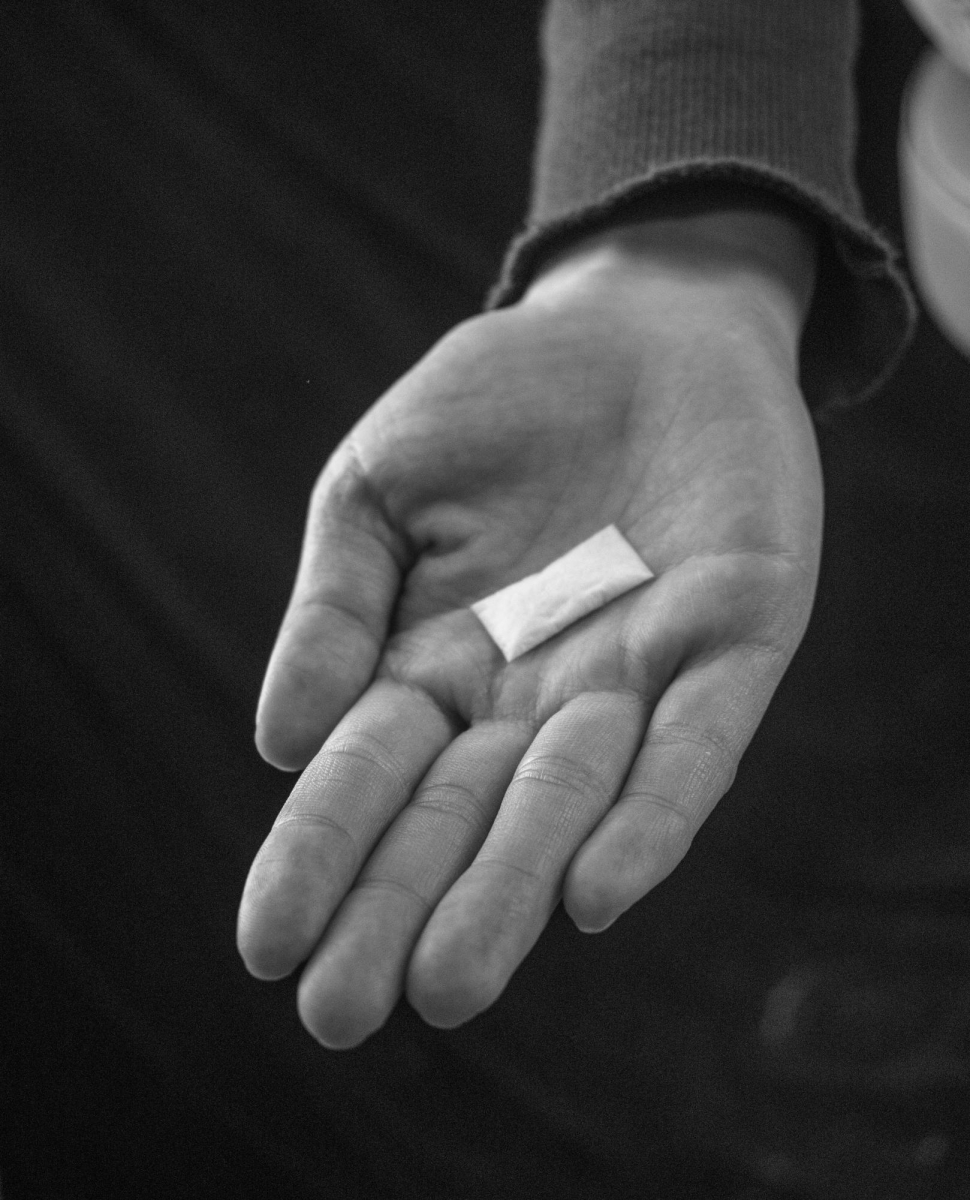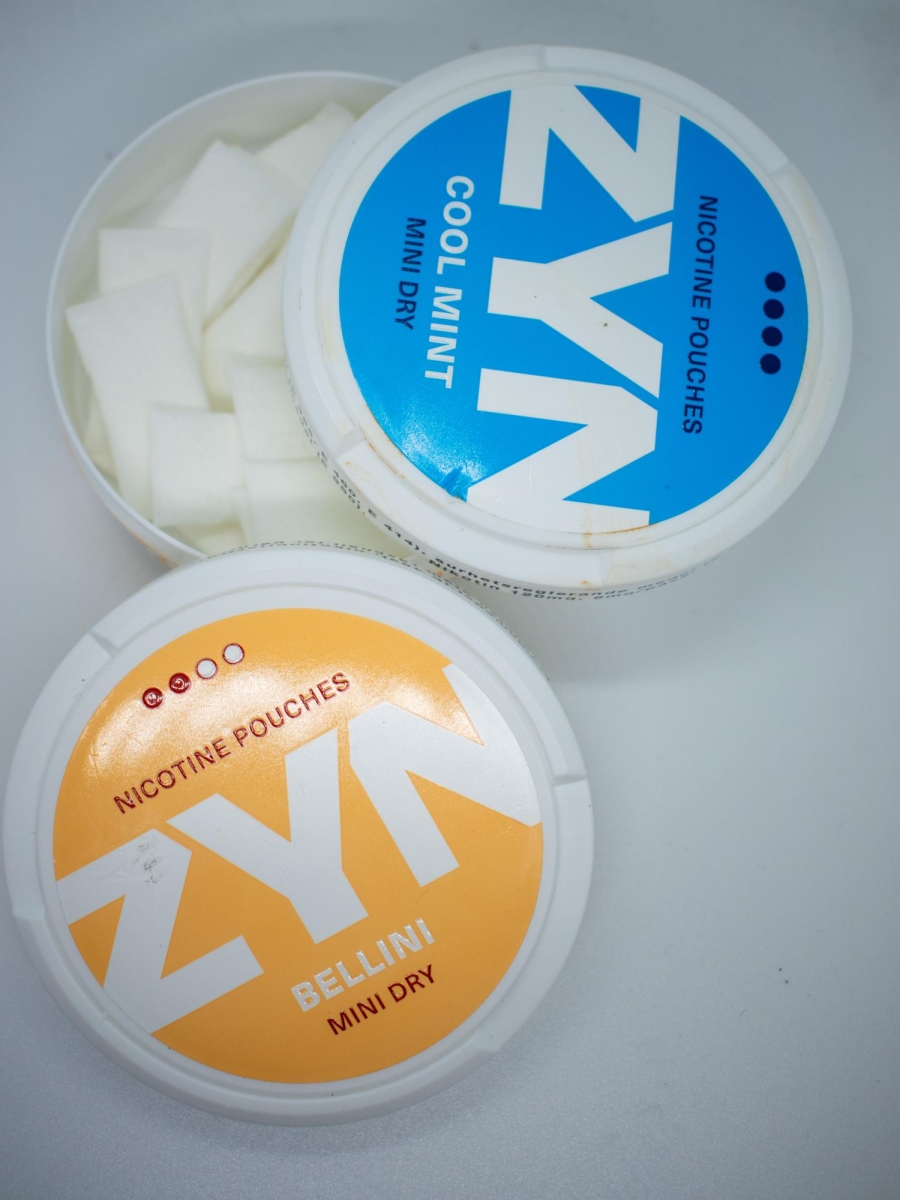Music blasts through the neighborhood as high schoolers stream into a party. As usual, teenagers drink alcohol out of red Solo cups and hit their vapes. But there is also something new. Some teens hold colorful circular objects shaped like hockey pucks, occasionally opening them, taking out a small white pouch and meticulously placing it inside their upper lip.
These small white pouches filled with nicotine salts, among other ingredients, have been gaining popularity, particularly among high schoolers. While only 1.5% of students reported consuming nicotine pouches in 2023, according to the US Food and Drug Administration, through its rising popularity on social media platforms, these pouches are seen as a trendy way to get a sweet nicotine buzz without the harmful effects associated with vapes and cigarettes.
Medical professionals have started to become aware of the rise in Zyn through different influences surrounding teenagers.
“Among teens and young people, we’re seeing more and more people using vapes as a source of nicotine and also Zyn pouches,” Dr. Anna Lembke, Medical Director of Youth Addiction at Stanford, said.
Nicotine is a stimulant, putting it in the same category as caffeine and amphetamines. According to Lembke, nicotine is highly addictive, and can improve anxiety and allow for more focused concentration in some people. Especially for teens, the use of nicotine at a young age may be a gateway to other addictive drugs and lack of brain development.
“If you get people [teenagers] hooked, when they have that brain chemistry that’s most vulnerable, you wind up with people using products for 20 to 30 years,” Dr. Jonathan Klein, a professor of pediatrics at Stanford University, said.
In the past, nicotine was usually inhaled either through smoking cigarettes or through vape devices which are commonly used by adolescents. However, according to Lembke, a rise in the popularity of Zyns has allowed for higher levels of nicotine intake.
“People tend to need to continue to use it more and more over time to get the same effect,” Lembke said. “[Zyn allows for] more potent forms [and] there’s also concern that these pouches can lead to high nicotine levels, which can potentially have many cardiac risk factors.”
Despite nicotine being highly addictive, many high school students find it helpful in different aspects of everyday life, such as focusing in school.
“My GPA has gone up significantly from what it was before and I think the nicotine pouches I use played a big role in that,” a Paly student, who asked that their name not be used to protect their identity, said.
Furthermore, many athletes who us Zyn as many feel that it improves their athletic performance.
“I have recently seen an increase in the usage of Zyns most prominently in sports,” said a second Paly senior who wished to withhold his identity. “I know many high school athletes who regularly use Zyn products because they believe it makes them play better.”
However, according to Klein, nicotine has shown no correlation with boosted athletic performance.
“It [Zyn] increases your body’s metabolic burn rate and it increases the amount of oxygen necessary to function,” Klein said. “It’s not clear that [Zyn] actually has any performance advantage and certainly for physical function.”
Social media has been a big factor in the increasing use of Zyns among high schoolers, with celebrities like Tucker Carlson and NELK boys promoting Zyns through their social media platforms, with each video getting millions of views.
Klein said the influx of pro-Zyn content on social media wasn’t unexpected to him, as the tobacco industry has a history of trying to promote a variety of nicotine products.
“I wasn’t really all that surprised [about the rise of Zyns] because the tobacco industry has periodically tried to promote a variety of different products, which have the same goal of getting people addicted … creating a lifelong or at least a decade-long addiction,” Klein said.
The tobacco industry has commonly paid other influencers to promote their product in order to get either their product, whether it be Zyns, vapes, or cigarettes, to a wider audience.
“They [the tobacco industry] pay people to post and they pay people to pose to our popular influencers who have big followings,” Klein said. “Some of it is paid advertising, but a lot of it is product placement and payment for placement.”
With the harms nicotine possesses for health, false advertising towards teens especially have proven to be a problem.
“Their [nicotine companies] marketing them as having medicinal value or being healthy, which I think is potentially misleading,” Lembke said.
On Jan. 23, 2024, the Democratic Senate Majority Leader Chuck Schumer called for a federal crackdown on Zyns. Schumer said that these nicotine pouches target adolescents, and then hook them through social media, according to The Hill. Still, with the use of Zyn increasing in athletes and high school students in general, the tobacco industry always seems to be one step ahead of regulations.
“The FDA now actually has the ability to regulate all tobacco products…and the [tobacco] industry is trying to stay ahead of any regulation,” Klein said. “But it’s still remarkably easy for underage buyers to get access to tobacco products.”
According to Klein, many parents are not aware of the current products being advertised towards their children.
“I think [it is] equally important for parents to understand that if something is being promoted to young people, it’s important to talk about those things and make sure that their kids are aware of them,” Klein said. “The more people [that] are sensitized to that and recognize the false messaging, the better.”
“Since its usage has been so positively promoted, many young people have become addicted,” the anonymous senior said. “I think the nicotine industry has created a better-sounding alternative to smoking or chewing tobacco but its usage still promotes harm to our bodies.”






